________________
516 The Philosophy of the Bhagavad-gitā [CH. being due to the combined operation of these five elements, it would be wrong to think the self or the agent to be the only performer of actions. Thus it is said that, this being so, he who thinks the self alone to be the agent of actions, this wicked-minded person through his misapplied intelligence does not see things properly?. Whatever actions are performed, right or wrong, whether in body, speech or mind, have these five factors as their causes. The philosophy that underlies the ethical position of the Gītā consists in the fact that, in reality, actions are made to happen primarily through the movement of the characteristic qualities of praksti, and secondarily, through the collocation of the five factors mentioned, among which the self is but one factor only. It is, therefore, sheer egoism to think that one can, at his own sweet will, undertake a work or cease from doing works. For the prakşti, or primal matter, through its later evolutes, the collocation of causes, would of itself move us to act, and even in spite of the opposition of our will we are led to perform the very action which we did not want to perform. So Krşņa says to Arjuna that the egoism through which you would say that you would not fight is mere false vanity, since the praksti is bound to lead you to action?. A man is bound by the active tendencies or actions which necessarily follow directly from his own nature, and there is no escape. He has to work in spite of the opposition of his will. Prakyti, or the collocation of the five factors, moves us to work. That being so, no one can renounce all actions. If renouncing actions is an impossibility, and if one is bound to act, it is but proper that one should perform one's normal duties. There are no duties and no actions which are absolutely faultless, absolutely above all criticism; so the proper way in which a man should purify his actions is by purging his mind of all imperfections and impurities of desires and attachment. But a question may arise how, if all actions follow necessarily as the product of the five-fold collocation, a person can determine his actions? The general implication of the Gitā seems to be that, though the action follows necessarily as the product of the fivefold collocation, yet the self can give a direction to these actions; if a man wishes to dissociate himself from all attachments and desires by dedicating the fruits of all his actions to God and clings to God with such a purpose, God helps him to attain his noble aim. 1 Gitā, XVIII. 16.
Ibid. XVIII. 15.
3 Ibid. XVIII. 59.




